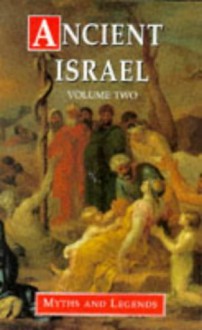
I guess the thought that went through my mind when I first saw this book was typical of my ignorance, and that was 'what myths and legends could Ancient Israel have that is outside the Bible?' Well, the first and major one (which doesn't appear in this volume as this volume deals with the early monarchy, particularly King Solomon) would be the myth of Lilith. As the myth goes, before God created Eve as a companion for Adam, God created Lilith. In fact Lilith was the first woman, but her sin was that she refused to take Adam as her husband and thus she was cursed. I personally do not know the full myth beyond that which is reproduced in some roleplaying products (such as Vampire the Masquarade), but I am sure if you search the internet you can find it.
As mentioned, this book primarily deals with the myths that arose from King Solomon, and to be quite honest, there are quite a few of them. For instance, when I was a kid I remember a carpet store called Solomon's carpets, and their logo was some Persian guy riding a magic carpet.

The Solomon of Solomon's carpets was actually the King Solomon of the Bible, the guy that asked for wisdom, and got wealth and long life as well. Yes, he did actually have a magic carpet according to the myth, but this wasn't some small magical carpet, this carpet was humongous. In fact it was big enough to carry an entire army. No wonder Solomon was one of the greatest kings of his time, since according to myth, he could load his army onto the carpet and fly over his enemy's territory and drop his army off paratrooper style.
Another story of Solomon was how he built the temple. According to the Bible he used slave labour (I suspect that much of the labour was also Israelite, but then since Solomon was a great king and ruled a large kingdom, he probably had lots of slaves). Well, the Bible suggests that the slaves were human, but the myths say that the slaves were demons. Apparently Solomon had a ring that had a demon lord bound to it, and as long as the ring was in his possession, the demon lord, along with the demons under this particular lord, were all bound to Solomon. Thus, with this ring he was able to command a legion of demons, which he forced to build the Temple of the Lord.
Personally, I think to suggest that Ancient Israelite legend is restricted to the Bible really does not do justice to the nature of the culture. We do know, from the Bible, that in Jesus' time a lot of tradition had passed down through the ruling class, tradition that sat pretty much outside of the biblical account. For instance we have the apocrypha, which was apparently written between the Old Testament and the New Testament. Many pastors I have heard hold the idea that the book of Malachi was the last time God spoke to his people, which was why John the Baptist was so popular because, after 400 years, a prophet had returned to Israel. However, what is generally ignored (unless it forms part of the sermon of course) is that John the Baptist lived and acted as Elijah the prophet. When some guy dressed in camel skins suddenly appeared spouting theology, the Jews did not go 'oh, woah, a prophet' no, they actually said 'oh, woah, the prophet Elijah'.
Look, I'm not going to lean either way on the argument as to whether God sent prophets in the intertestimental period or not, nor am I going to indicate whether God still sends prophets today (particularly since some so called prophets are not really prophets, and the Bible indicates how you can tell, and it usually involves them making the statement that they are a prophet who has been sent by God to tell you to give him all your money, or some such thing), but still, I find such legends coming from Israel (who had its fair share of impressive miracles without needing any myths or legends) rather entertaining.

 Log in with Facebook
Log in with Facebook 





